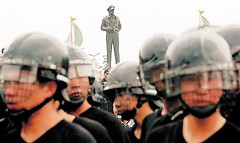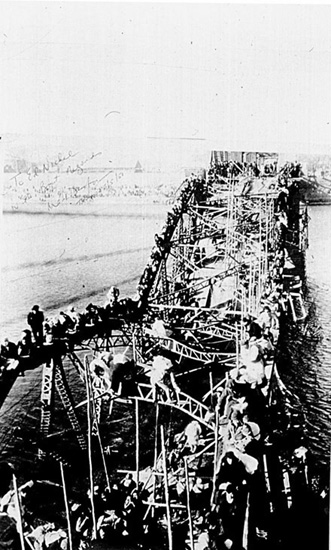The Korean Left’s New Blood Libel
Update 9/16/05: We have solved the mystery of where Park gets his MacArthur quote–a history textbook from North Korea whose poisonous content found a willing host in the radical politics of South Korea. Must read to believe.
Park Seong-Hwan, the epic poet who (may or may not have*) brought us “Fucking USA“* has penned a new ditty that will soon hit Korea’s Top 40, and it’s a real piece of historical scholarship:
Between verses two and three, Park adds his own narration. “Seize Seoul. There are girls and ladies there. For three days, Seoul will be yours — UN Commander Douglas MacArthur, September 1950.” Park says historical records confirm that this is an authentic quote by the maverick commander.
 A yahoo search confirms the obvious–that this is wet, steamy, fecal fraud straight from the bowels of a man who wouldn’t recognize the difference between the truth and a lie if I posted a simple diagram to his unloved face with my pneumatic nail gun. What’s equally obvious is that millions of young South Koreans will believe every last noxious, lying word of it. The absence of outrage by Americans who underestimate the power of popular culture and the confessional persuasion of silence will lend weight to their belief.
A yahoo search confirms the obvious–that this is wet, steamy, fecal fraud straight from the bowels of a man who wouldn’t recognize the difference between the truth and a lie if I posted a simple diagram to his unloved face with my pneumatic nail gun. What’s equally obvious is that millions of young South Koreans will believe every last noxious, lying word of it. The absence of outrage by Americans who underestimate the power of popular culture and the confessional persuasion of silence will lend weight to their belief.
Among the readers of this site are some very intelligent people whose research skills have proven to be extraordinary truth engines. I couldn’t find anything even distantly resembling such a quote, and if MacArthur has said anything like this, you’d think that some Bruce Cumings piece would have been repeatedly and perpetually quoted on ZMag, Indymedia, or Common Dreams, despite the fact that Cumings was pretty thoroughly discredited by the opening of the Soviet archives. It hasn’t, and Cumings is just one of the dogs that didn’t bark. In the meantime, help me either see where I’m wrong or call this peddler of Pyongyang’s lies out.
But of course, this treats the offal of an established fool as serious historical debate, and I don’t just mean Cumings. That is sort of my point here . . . that this is the point at which we’ve now arrived. Yes, it’s a tired cliche that flirts with Godwin’s Law, but The Big Lie is being repeated, and an aggressive regimen of truth–in suppository form, if need be–is the only antidote. But it will not come, and the reason is that we’re too afraid to upset the folks.
Park is on the official imbicile registry, of course, and we could take comfort from the fact that one registered imbicile speaks only for a few if it weren’t for the fact that Park has now brought this lie into the center of Korea’s youth culture and told it with malice aforethought:
“I released the song ahead of protests planned for Sunday calling for the statue to be removed,” singer Park Seong-hwan told the Chosun Ilbo on Friday. “I wanted to teach people about the side of MacArthur ordinary people don’t know about.”
Park and Yun Min-Seok–if one is indeed Garfunkel to the other’s Simon, or Hall to Oates, if you prefer–do us the service of at least being honest about their allegiance. Here’s a bit from one of Yun’s recent songs:
사는게 ޘ들다 ëŠÂë‚„ 땠É양얠가 보세ìš”
ì–´ë ¤ì›Œë„ 웃으며 살아가는 그런 사람들 있ì£ì‚¬ëžŒìÂËœ ì •ì´ 그리울 땠É양얠가 보세ìš”
ëˆ으로 사ê³ ÃÅ’” 수 얆는 그런 ìÂ¸ì •ì´ 있ì£Ã‰양얠가 보세ìš” 사람ì´ ì‚´ê³ 있는
É양얠꼠가 보세ìš” ê³ Ã–¥ê°€ëŠ” 마ìŒ으로When you feel that life is difficult, go to Pyongyang.
There are people who smile, even though things are difficult.
When you miss human affection, go to Pyongyang.
There is brotherly love that you can’t buy or sell for money.
Go to Pyongyang.
Definitely go to Pyongyang, where people live.
With the feeling of going home . . . .
Interestingly, Park never took his own advice, and that goes for the millions of South Korean refugees during the war, who, oddly enough, didn’t exactly flee North to escape the invading hordes of Yankee rapists:

As recently as this week, the refugees were still flowing the same way, although the passage has become much more difficult than the easy stroll depicted above.
In South Korea, hating America has become a cottage industry, a persistent cultural fashion, and a road to success, at least for Park Seong-Hwan and Yun Min-Seok. It’s also become an established political fact that’s well documented by polling data, which critics often try to discount but seemingly can’t contradict. Our challenge is to confront that unpleasant fact and respond to it. “Confront” and “coddle” are virtual antonyms, so we’re doing something very wrong here.
On Sunday, September 11th, when that demonstration takes place at Incheon, one of two things will happen. One possibility is that Park’s friends will succeed at drawing a big, nasty mob out in front of every American television screen on 9/11, meaning that we may well cross the Bridge of No Return in U.S.-ROK relations. The other is that the demonstrations will fail this time, leaving the faithful this pillar to stone during their next pilgrimage. Much tea is sipped with crooked pinkies in Foggy Bottom, Georgetown, and Kwachon-Shi by those who reflexively turn aside and bravely peddle the pretense that all is well between our countries and societies. They will ignore and conceal the ugliness for the sake of “bilateral relations” that will only worsen, just as they have for the last decade as we accepted their counsel. For fear of the doctor’s probe, they will ignore the growing tumor for another day. If I’ve ever seen a prescription for metastasis, this is it.
Alliances rest on the public acceptance of common interests. A top-to-bottom reassessment of both these interests and their public acceptance is desperately needed if some useful remnant of the alliance is to be saved. American policymakers, scholars, and wonks would pretend that our problems in Korea will be solved by the next Korean election. Korean wonks pretend it will be solved by the next American election. And for how long, if only an aging and shrinking minority of Koreans don’t think our soldiers want to eat their babies and rape their mothers? How long can “bilateral relations” last if the GNP remains rudderless and unable to aggressively speak the truth about both history in the past and the hell of the present, which begins just thirty miles North of Seoul? Will it take another anti-American mini-pogrom, a formal rupture of the alliance, or a war to tell us that the problem with Korea is that Korean politicians and media have sold them on hating America?
It took 9/11 and Iraq for the United States to realize the extent to which Middle Eastern media had sold them hate. Thankfully, there are signs that U.S.-sponsored al-Hurrah is making progress in penetrating the Middle Eastern market, and God willing, may one day help move the debate back toward sanity.
Today, the South Korean government is increasingly reverting to authoritarian methods to suppress the media and the opposition. Just a few examples include its vicarious suppression of Radio Free NK, its intimidation of peaceful demonstrators, government officials’ open threats against opposition newspapers, including this recent “declaration of all-out war,” and at least one an act of violence that may have been inspired by this rhetoric. The time may come when an al-Hurrah for Korea may be the only media in either of the Koreas that can speak openly of what is really happening anywhere on the peninsula. It would be regrettable if once again, our government were unable to awaken to that until the unanswered hate and distortions cost more lives. Those who really want to improve bilateral relations, take note: there is a cancer, and the failure to diagnose it will only abet its growth.
Photo creds: Chosun Ilbo; Max Desfor, AP.
* Blogger’s note: OK, I’m confused. The article says Park Seong-Hwan performed “Fucking USA,” and this says it was Yun Min-Seok who wrote it. Is Park the performer and Yun the writer? You mean that you have to outsource the authorship of this back-of-a-bar-napkin tripe? Help me out here.
Update: Another message for the pollyannas–you can’t pretend this isn’t a problem when I’m getting e-mails about this from highly regarded congressional staffers. If you want to save a useful U.S.-Korean alliance, then you have to confront what’s poisoning it.
2 Responses